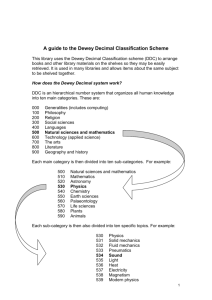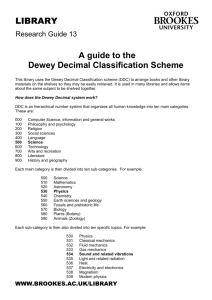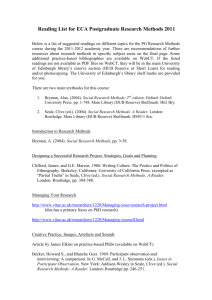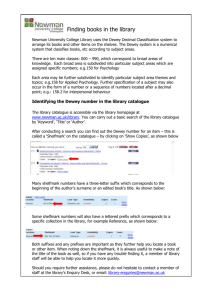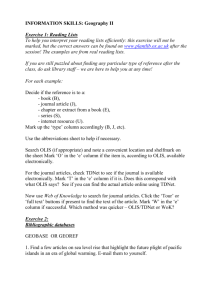The financial crisis (credit crunch)
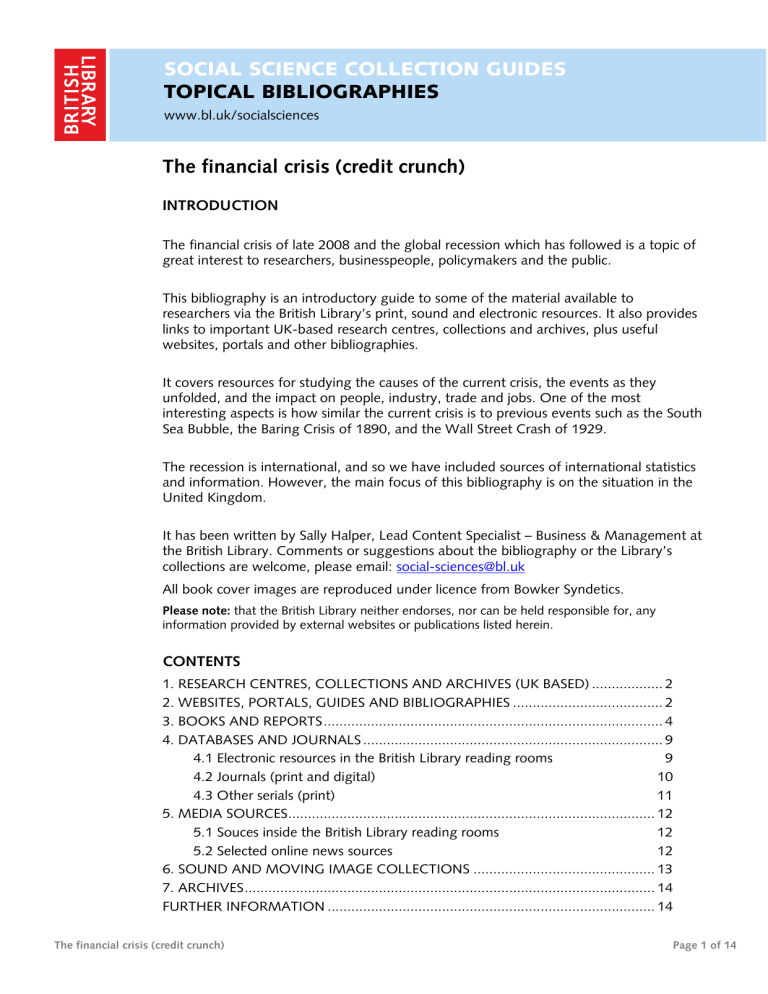
SOCIAL SCIENCE COLLECTION GUIDES
TOPICAL BIBLIOGRAPHIES
www.bl.uk/socialsciences
The financial crisis (credit crunch)
INTRODUCTION
The financial crisis of late 2008 and the global recession which has followed is a topic of great interest to researchers, businesspeople, policymakers and the public.
This bibliography is an introductory guide to some of the material available to researchers via the British Library’s print, sound and electronic resources. It also provides links to important UK-based research centres, collections and archives, plus useful websites, portals and other bibliographies.
It covers resources for studying the causes of the current crisis, the events as they unfolded, and the impact on people, industry, trade and jobs. One of the most interesting aspects is how similar the current crisis is to previous events such as the South
Sea Bubble, the Baring Crisis of 1890, and the Wall Street Crash of 1929.
The recession is international, and so we have included sources of international statistics and information. However, the main focus of this bibliography is on the situation in the
United Kingdom.
It has been written by Sally Halper, Lead Content Specialist – Business & Management at the British Library. Comments or suggestions about the bibliography or the Library’s collections are welcome, please email: social-sciences@bl.uk
All book cover images are reproduced under licence from Bowker Syndetics.
Please note: that the British Library neither endorses, nor can be held responsible for, any information provided by external websites or publications listed herein.
CONTENTS
1. RESEARCH CENTRES, COLLECTIONS AND ARCHIVES (UK BASED) .................. 2
2. WEBSITES, PORTALS, GUIDES AND BIBLIOGRAPHIES ...................................... 2
4.1 Electronic resources in the British Library reading rooms 9
4.2 Journals (print and digital) 10
5.1 Souces inside the British Library reading rooms 12
5.2 Selected online news sources 12
6. SOUND AND MOVING IMAGE COLLECTIONS .............................................. 13
The financial crisis (credit crunch) Page 1 of 14
Social Sciences collection guides
Topical bibliographies
1. RESEARCH CENTRES, COLLECTIONS AND ARCHIVES (UK BASED)
Access to Archives (A2A) http://www.nationalarchives.gov.uk/a2a/
Find relevant archives and special collections, including detailed catalogues of the East
India Company archives, part of the India Office Records held at the British Library in
London.
Economists’ Papers http://www.economistspapers.org.uk
This website, supported by the Royal Economic Society, is an electronic version of a finding aid originally published in 1975 as Economists’ Papers 1750-1950: a Guide to
Archive and other Manuscript Sources for the History of British and Irish Economic
Thought.
ESRC Economic Research Centres http://www.esrc.ac.uk/ESRCInfoCentre/about/CI/CP/Our_Society_Today/economists/E conomicResearchCentresProgrammes.aspx
Major research centres funded by the UK Economic and Social Research Council (ESRC), with links to their websites. Includes the Centre for Economic Performance at LSE, and the World Economy and Finance Research Programme , which has its own discussion forum at http://www.worldeconomyandfinance.org/blog/
Kings College Library, Cambridge http://janus.lib.cam.ac.uk/db/node.xsp?id=EAD/GBR/0272/PP/JMK
Holds the papers of John Maynard Keynes, among others.
SCoRe (Search Company Reports) http://www.score.ac.uk
SCoRe is a catalogue which will help you find copies of printed company annual reports held in member libraries around the UK. It does not provide links to digitised reports online.
2. WEBSITES, PORTALS, GUIDES AND BIBLIOGRAPHIES
News and broadcast media websites (such as The Guardian’s Credit Crunch microsite) are described in the 'Media Sources' section below.
Bank of England Statistics website http://www.bankofengland.co.uk/statistics/
Credit Crash Britain http://www.open2.net/creditcrashbritain/index.html
Website compiled by the BBC and the Open University aimed at students on undergraduate-level courses and lecturers looking for teaching material. It contains video clips, blogs, links to radio programmes like The Money Programme and pages of text.
The financial crisis (credit crunch) Page 2 of 14
Social Sciences collection guides
Topical bibliographies
There are features on the banks and their financial problems.
Credit Crunch website collection http://www.webarchive.org.uk/ukwa/collection/
This collection of websites was initiated in July 2008 to reflect how the UK has been affected by the global financial crisis. As at September 2009, it contains over 300 sites.
The sites have been archived by the British Library as part of the UK Web Archiving
Consortium. The collection includes the websites of banks, corporations, local governments, consumer and financial advisory groups as well as blogs and commentaries.
A Credit Crunch Reader http://www.iea.org.uk/files/upld-book452pdf?.pdf
Bibliography compiled by the Institute of Economic Affairs (IEA) in London of largely
American sources about the current financial crisis, focusing on websites, blogs and reports published by thinktanks and academics.
ESRC - Recession, Research and Response http://www.esrc.ac.uk/ESRCInfoCentre/about/CI/CP/Our_Society_Today/economists/
RecessionResponseAndResearch.aspx
Contains selected articles by researchers funded by the UK Economic and Social Research
Council (ESRC).
ILO Jobs Crisis Observatory http://www.ilo.org/pls/apex/f?p=jobcrisis:1:3120651773231673
High-quality website from the International Labour Organization (ILO) examining the impact of the economic crisis and policy responses. Each week, it highlights a selection of newly-published global and regional information, new articles and analysis from ILO specialists, and information on particular topics, with lots of links to other useful websites. Once a month, the latest ILO labour market statistics are added.
Intute – Credit Crunch http://www.intute.ac.uk/cgi-bin/search.pl?term1=Credit+Crunch&limit=0&subject=All
Selected internet resources and blogs on the credit crunch.
National Statistics website http://www.statistics.gov.uk/default.asp
In-depth statistics, charts and commentary on the UK economy, labour market, trade etc.
New Palgrave Dictionary of Economics
This powerful full-text resource is available electronically in our London reading rooms.
Most articles include a detailed bibliography. See 'Databases and Journals' section below for details.
Peston’s Picks http://www.bbc.co.uk/blogs/thereporters/robertpeston/
The financial crisis (credit crunch) Page 3 of 14
Social Sciences collection guides
Topical bibliographies
Robert Peston is the BBC’s Business Editor. His scoop on Northern Rock started the first run on a UK bank since 1866. His blog contains his observations on the financial crisis as it unfolded, comment and analysis.
3. BOOKS AND REPORTS
We have not included any fiction about the economic downturn in the following selection of books and reports - although there are many relevant works of fiction about financial and economic crises, for example: Tulip Fever by Deborah Morgan, The Grapes of Wrath by John Steinbeck, or The Money Changers by Arthur Haley.
Search tip: When searching by title, please note that there is usually a space before and after the colon which separates title and subtitle e.g. The Corporation: The Pathological Pursuit of Profit and Power.
The following explanation will help you understand how you can tell which books are available in the British Library reading rooms, which ones you need to order up, and which ones you can get on inter-library loan:
If the shelfmark of the item in this bibliography says:
London Reference Collection - the book can only be used in the reading rooms in
London or Yorkshire, and you must request it using the British Library catalogue at http://catalogue.bl.uk.
When you request the item, it will say how long it takes to be delivered to the reading room (70 minutes or 48 hours, depending whether the item is stored in London or Yorkshire and whether you are using a reading room in London, or
Boston Spa in Yorkshire).
London Reference Collection OPL – the book is on the shelves in the Social Science
Reading Room at St Pancras, in the Reference Books OPL sequence. You must come to
London to use it.
London Reference Collection SPIS – the book is on the shelves in the Social Science
Reading Room at St Pancras, in the SPIS sequence. You must come to London to use it.
London Reference Collection BIPC: For example, (B) MKT 332.7 Business. This report is on the shelves in the BIPC reading room. You must come to London to use it.
DS shelfmark – the book is a D ocument S upply item. You can either order it for delivery to the reading rooms in London, which takes up to 48 hours, or you can order it to be sent to you on inter-library loan through your University librarian or corporate account.
See http://www.bl.uk/reshelp/atyourdesk/docsupply/index.html for more details.
Ahamed, L. Lords of Finance . Heinemann, 2009.
Very readable history of the 1929 crash and the men behind it.
London Reference Collections shelfmark: SPIS332.10922
Allen, F. (ed) and Gale, D. (ed) Financial Crises . Edward Elgar, 2009.
London Reference Collections shelfmark: SPIS338.542
The financial crisis (credit crunch) Page 4 of 14
Social Sciences collection guides
Topical bibliographies
Attwood, M. Payback.
Bloomsbury, 2008.
Explores the concept of debt through history.
London Reference Collections shelfmark: YK.2009.a.7273
Augar, P. Chasing Alpha . Bodley Head, 2009.
Former banker traces the rise and fall of the
City.
London Reference Collections shelfmark:
SPIS332.10941
Brummer, A. The Crunch. Random House, 2008.
Clear account of the origins of the credit crunch by the
Daily Mail’s City editor.
London Reference Collections shelfmark: SPIS339.53
DS shelfmark: m08/.35442 DSC
Bruner, R. F. The Panic of 1907 . Wiley, 2007.
London Reference Collections shelfmark: YK.2008.a.497
DS shelfmark: m07/.32768 DSC
Brussee, W. The Second Great Depression.
Booklocker, 2005.
DS shelfmark: m07/.34265 DSC
Cable, V. The Storm.
Atlantic, 2009.
London Reference Collections shelfmark: SPIS338.542
Chorafas, D. Financial Boom and Gloom.
Palgrave-Macmillan, 2009.
DS shelfmark: m09/.19819 DSC
Cooper, G. The Origin of Financial Crises.
Harriman
House, 2008.
DS shelfmark: m09/.10129 DSC
Dale, R. The First Crash: Lessons from the South Sea Bubble.
Princeton University Press, 2004.
See also International Banking Deregulation , below.
London Reference Collections shelfmark: YC.2006.a.6827
DS shelfmark: m04/.35873 DSC
Dale, R. International Banking Deregulation: The Great Banking Experiment . 1993.
London Reference Collections shelfmark: YK.1992.b.2556
DS shelfmark: 92/06607 DSC
In this book, Professor Dale of Southampton University warned of the consequences of dismantling the Glass Seagall Act of 1932, put in place following the crisis of 1929-1933 and dismantled in 1999.
Datamonitor. Verdict on the Credit Crunch 2008 . Datamonitor, 2008.
London Reference Collections BIPC shelfmark: (B) MKT 332.7 Business
The financial crisis (credit crunch) Page 5 of 14
Social Sciences collection guides
Topical bibliographies
Market research report focusing on consumer markets in the UK.
Duckenfield, M. (ed) ( The) History of Financial Disasters 1763-1995 . Pickering &
Chatto, 2006. Three-volume set.
London Reference Collections shelfmark: YC.2006.a.17607 vol. 1,
YC.2006.a.17634 vol. 2, YC.2006.a.17635 vol. 3
DS shelfmark: YD.2009.a.4093 vol. 1 DSC, m08/.28885 vol. 2 DSC, m08/.28886 vol. 3 DSC
Tip:
Don’t use the word ‘The’ when searching for it on our catalogue .
El-Erian, M. When Markets Collide. McGraw-Hill, 2008.
London Reference Collections shelfmark: SPIS381.101
Elliott, L. The Gods That Failed . Bodley Head, 2008.
London Reference Collections shelfmark: SPIS330.9051
DS shelfmark: m08/.25811 DSC
Emmett, R. (ed) Great Bubbles: Reactions to the South Sea Bubble, the Mississippi
Scheme and the Tulip Mania Affair . Chatto, 2000. 3-volume set.
London Reference Collections shelfmark: YC.2003.a.13847
DS shelfmark: m04/.38188 DSC vol. 1, m04/.38189 DSC vol. 2, m04/.38190 DSC vol. 3
Brings together some of the most important work on these three crashes.
Ferguson, N. The Ascent of Money. Allen Lane, 2008.
DS shelfmark: m08/.38055 DSC
Foster, J. B. and Magdoff, F. The Great Financial Crisis. Monthly Review Press, 2009.
DS shelfmark: m09/.16820 DSC
Galbraith, J.K.
Penguin.
A Short History of Financial Euphoria. Whitle,
London Reference Collections shelfmark: YC.1994.a.3638
DS shelfmark: 78/2838 DSC
Galbraith, J.K. The Great Crash 1929. Houghton-Mifflin, 1997.
London Reference Collections shelfmark: X.809/45484 (the
1980 edition)
DS shelfmark: 99/17634 DSC (the 1997 edition)
This seminal text has been in print consistently since it was first published in 1955.
Glyn, A. Capitalism Unleashed: Finance, Globalisation and Welfare. Oxford University
Press, 2006.
London Reference Collections shelfmark: SPIS330.904
DS shelfmark: m06/.24858 DSC
The financial crisis (credit crunch) Page 6 of 14
Social Sciences collection guides
Topical bibliographies
Goodhart, C. The Regulatory Response to the Financial Crisis . Edward Elgar, 2009.
DS shelfmark: m09/.18456 DSC
Goodhart, C. The Regulatory Response to the Financial Crisis (Special paper (LSE
Markets Group) No. 177) . London School of Economics, 2008.
London Reference Collections shelfmark: (B) 332.1 177
Gray, J. False Dawn.
Granta, 2002.
Philosopher John Gray examines what he sees as the delusion of global capitalism.
London Reference Collections shelfmark: YC.a.1096
DS shelfmark: m03/12364 DSC
Greenspan, A. The Age of Turbulence . Penguin, 2008.
London Reference Collections shelfmark: SPIS332.11092
DS shelfmark: m08/.11400 DSC
Jones, J. P. Keynes’s Vision: Why the Great Depression Did Not Return . Routledge,
2008.
London Reference Collections shelfmark: YC.2008.a.717
DS shelfmark: 8026.519500 no. 90 DSC
Keynes, J. M. The General Theory of Unemployment, Interest and Money.
Palgrave,
2007. Reprint of the 1936 classic. See also: Skidelsky’s biography of Keynes.
London Reference Collections shelfmark: YC.2008.a.1716
DS shelfmark: m07/.36047 DSC
Kindleberger, C. Manias, Panics and Crashes: A History of Financial Crises (5 th edition) .
Palgrave-Macmillan, 2005.
London Reference Collections shelfmark: YC.2009.a.11251
DS shelfmark: m05/.33130 DSC
Extremely good. The 6 th edition - due to be published in December 2009 - covers the
2008 financial crisis alongside its predecessors.
Krugman, P. The Return of Depression Economics and the Crisis of 2008.
Allen Lane,
2008.
DS shelfmark: m09/.12628 DSC
Lefèvre, E. Reminiscences of a Stock Operator.
Wiley, 2006.
London Reference Collections shelfmark: YK.2006.a.10567
Interesting to compare this account of 1920s Wall Street and the success of Jesse
Livermore, a pioneer of short selling, with modern equivalents.
Lewis, M. Liar’s Poker . Hodder & Stoughton, 1989.
London Reference Collections shelfmark: YC.1989.b.8137
Former employee of Salomon Brothers recounts his experience on Wall Street in the late
1980s, including the birth of the ‘mortgage-backed security’ derivative which contributed to the 2008 crash. Interesting to read alongside Lefèvre, above.
The financial crisis (credit crunch) Page 7 of 14
Social Sciences collection guides
Topical bibliographies
Mason, P. Meltdown . Verso, 2009.
DS shelfmark: m09/.20852 DSC
BBC journalist Paul Mason examines the causes of the events that froze the financial system in 2008. Recommended as one of the more accessible and readable accounts.
Minsky, H. P. Stabilising an Unstable Economy . McGraw-Hill, 2008.
London Reference Collections shelfmark: SPIS339.5
DS shelfmark: m09/.19530 DSC
Mintel. Consumer Reaction to the Credit Crunch.
Mintel, 2009.
London Reference Collections BIPC shelfmark: (B) MKT 338.473327 Business
Market research report focusing on the UK consumer market, from October 2008 to
January 2009.
Morris, C. R. Trillion Dollar Meltdown . Public Affairs, 2008.
DS shelfmark: m08/.17096 DSC
Peston, R. Who Runs Britain?
Hodder & Stoughton, 2008.
London Reference Collections shelfmark: SPIS330.941086
DS shelfmark: m08/.27700 DSC
Robert Peston is the journalist whose scoop on Northern Rock prompted the first run on a bank since 1866. See also: his blog, Peston’s Picks.
Rapp, D. A. Bubbles, Booms and Busts . Springer, 2009.
DS shelfmark: m09/.28306 DSC
Rochet, J-C. Why Are There So Many Banking Crises?
Princeton University
Press, 2008.
London Reference Collections shelfmark: YK.2008.a.10189
DS shelfmark: m08/.17266 DSC
Shiller, R. The Sub-prime Solution.
Princeton University Press, 2008.
London Reference Collections shelfmark: SPIS332.722
DS shelfmark: m08/.30110 DSC
Skidelsky, R. John Maynard Keynes 1883-1946.
Pan, 2004.
London Reference Collections shelfmark: YC.2005.a.5428
Keynes’s biographer assesses the relevance of the economist whose ideas helped the world recover after the Great Depression of the 1930s.
Soros, G. The Credit Crisis of 2008 and What it Means . Public Affairs, 2008.
DS shelfmark: m09/.20731 DSC
This is the updated edition, with four new chapters, of the book The New Paradigm for
Financial Markets (which was published earlier in 2008).
The author’s website includes a free chapter, see http://www.georgesoros.com/
The financial crisis (credit crunch) Page 8 of 14
Social Sciences collection guides
Topical bibliographies
Taleb, N. The Black Swan: The Impact of the Highly Improbable . A
2007.
London Reference Collections shelfmark: YC.2008.a.5523
DS shelfmark: m07/.22206 DSC
See also: Articles in The Observer and the Financial Times by, and
Taleb.
Taleb, N. Fooled by Randomness (2 nd edition).
Penguin, 2007.
London Reference Collections shelfmark:
YK.2008.a.10284
DS shelfmark: m08/.28570 DSC
Turner, G. The Credit Crunch . Pluto Press, 2009.
DS shelfmark: m08/.24645 DSC
Wolf, M. Fixing Global Finance . John Hopkins University Press, 2008.
DS shelfmark: m08/.32655 DSC
Please note:
The 2009 Yale University Press edition is On Order for our Document
Supply collection – please check the catalogue to see if it is available.
4. DATABASES AND JOURNALS
4.1 Electronic resources in the British Library reading rooms
The British Library provides our registered readers with access to a range of electronic resources to assist with their research. Due to licensing restrictions, many resources can only be accessed from computers in the Library’s reading rooms . Detailed information about the electronic resources available can be found at: http://www.bl.uk/eresources/main.shtml.
For example, registered readers in our BIPC reading room in London can use the
Economist Intelligence Unit service:
Other relevant databases that British Library registered readers can use in our London reading rooms include:
The financial crisis (credit crunch) Page 9 of 14
Social Sciences collection guides
Topical bibliographies
ABI Inform Global (ProQuest)
Contains over 2800 scholarly journals, 1800 of them in full text from 1987 onwards, plus
PHD and Masters’ theses. Indexing goes back to 1971.
Business Source Complete (EBSCO)
Contains over 11,000 sources, with over 1600 full text peer-reviewed journals and 1500 full text business magazines and trade journals.
Credit Crunch Chronology
This is a timeline of key events which gives a lot of leads for sources of key reports and other things to follow up. It is part of The Statesman’s Yearbook Online . British Library registered readers can use The Statesman’s Yearbook Online on the computers inside our reading rooms in London.
EIU Countrydata
Database of economic indicators (from 1980 onwards) and five-year forecasts for 117 countries and 40 regional aggregates, with up to 280 indicators per country.
New Palgrave Dictionary of Economics
Contains 1,872 articles on all aspects of economics by 1,506 contributors, including 25
Nobel Laureates in Economics. Includes the full text of the 8 volume print edition, plus new information and essays added quarterly. Most articles have their own bibliography.
Relevant articles include: banking crises, the credit cycle, trade cycle, the Great
Depression, the Baring crisis of 1890, layoffs, unemployment, welfare costs of recession, business cycle measurement, and many more.
SourceOECD
Contains online publications and statistics from the Organisation for Economic Cooperation and Development (OECD).
The Statesman’s Yearbook Online
Contains full text articles about the political reaction to the credit crunch, economic policy in the UK and other countries, and the Credit Crunch Chronology above. British
Library registered readers can use it on the computers inside our reading rooms in
London.
4.2 Journals (print and digital)
The list below is a selection of relevant journals for the study of the credit crunch available from the British Library. The database/s which contain each e-journal are shown in brackets:
• American Economic Review (Econlit with full text)
• Econometrica (Econlit with full text)
• The Economist (ABI Inform from 1992 onwards, Economist Historic Archive from
1843 to 2003)
• Explorations in Economic History (Chadwyck PAO Collection)
The financial crisis (credit crunch) Page 10 of 14
Social Sciences collection guides
Topical bibliographies
• Financial Statistics
• Journal of Banking Regulation
• Journal of Derivatives and Hedge Funds
• Journal of Economic History (JSTOR from 1941 to 2003, ABI Inform from 2001 onwards)
• Journal of Political Economy (Econlit with full text)
• Review of Economic Studies (Econlit with full text)
• Quarterly Journal of Economics (Econlit with full text)
4.3 Other serials (print)
We have many statistical serials you can use to trace the impact of the recession on the economy of the United Kingdom (as well as vast amounts of statistical information available in digital sources such as SourceOECD and the Economist Intelligence Unit sources described under 'Databases' above). Here are two examples of print statistical serials:
Economic and Labour Market Review
London Reference Collections shelfmark: SPIS National Statistics Collection
(from Volume 1, Number 1 (2007) onwards)
DS shelfmark: 3651.467100 DSC
United Kingdom Economic Accounts
London Reference Collections shelfmark: SPIS National Statistics Collection (latest 5 years)
DS shelfmark: 9082.656210 DSC
Many other scholarly journals and magazines at the British Library contain articles on the credit crunch. They include:
• Accounting, Organizations and Society
• Critical Perspectives on Accounting
• Forbes
• Harvard Business Review
We have an extensive range of print journals published in the UK and internationally.
Please search our catalogue at http://catalogue.bl.uk
for details.
See also: 'Media Sources' below, and the Directory of Open Access Journals http://www.doaj.org/
The financial crisis (credit crunch) Page 11 of 14
Social Sciences collection guides
Topical bibliographies
5. MEDIA SOURCES
5.1 Souces inside the British Library reading rooms
Relevant news sources available inside British Library reading rooms include:
Factiva
News and business information from more than 10,000 publications from 159 countries in 22 languages, covering nearly every industry and region from the mid 1990s to date.
Available in the BIPC and Social Science reading rooms in London.
The Economist (1992 to date)
The Economist , from 1992 to date, is available in full text in ABI/Inform Global. Earlier issues are contained in The Economist Historic Archive, below.
The Economist Historic Archive 1843-2003
Every issue of The Economist (UK edition) from the first issue in 1843 to the end of 2003 in facsimile i.e. all the illustrations, charts etc are included in the full text. A wonderful resource for studying the current economic situation in a historic and comparative context.
List of newspaper databases available from British Library Reading Rooms http://www.bl.uk/eresources/socsci/newspapers.html
5.2 Selected online news sources
Available from anywhere, not just in our reading rooms:
Guardian Unlimited Credit Crunch microsite http://www.guardian.co.uk/business/credit-crunch
Financial Times Lehman Brothers microsite http://www.ft.com/indepth/lehman-aftershock
BBC News – UK in recession website http://news.bbc.co.uk/1/hi/in_depth/business/2008/downturn/default.stm
News and in-depth articles on the financial crisis. Other parts of the BBC website also contain the occasional special report. For example: Where has all the money gone?
Article by John Sloman, Director of the Economics Network, a subject Centre of the UK
Higher Education Academy.
http://news.bbc.co.uk/1/hi/magazine/7670313.stm
BBC2 – The Love of Money microsite http://www.bbc.co.uk/programmes/b00mqmjs
Website of the BBC2 television series broadcast in September 2009. Offers an in-depth account of what happened to create the financial crisis of 2008.
Channel 4 – Dispatches http://www.channel4.com/programmes/dispatches/episode-guide
The financial crisis (credit crunch) Page 12 of 14
Social Sciences collection guides
Topical bibliographies
Well-researched documentaries you can watch in full online. Relevant programmes in the series include Will Hutton’s two-part investigation Crash - How the banks went bust and Crash - How long will the recession last?
Channel 4 News website
The Business & Money section contains news, in-depth analysis, graphs and video clips about the financial crisis and the state of the economy. For example:
Recession deepens as economy shrinks further http://www.channel4.com/news/articles/business_money/recession+deepens+as+econ omy+shrinks+further/3282357
Economic meltdown: Chicago School at fault?
http://www.channel4.com/news/articles/business_money/economic+meltdown+chicag o+school+at+fault/3321197
6. SOUND AND MOVING IMAGE COLLECTIONS
The British Library Sound Archive catalogue is available to search on our website at http://cadensa.bl.uk
. Notable collections include:
City Lives (C409)
This oral history collection consists of interviews recorded in 1995 with more than 140 people who have spent their working lives in the City of London. One of the issues covered is ethics and control. Recordings include representatives from the Stock
Exchange, the merchant and clearing banks, the commodities and futures markets, law and accounting firms, financial regulators, insurance companies and Lloyds of London.
It is also available as a book, with a chapter on ethics and control:
Courtney, C. and Thompson, P. City Lives . Methuen, 1996.
London Reference Collections shelfmark: YK.1996.b.15672
DS shelfmark: 97/06165 DSC
Oral history of Barings Bank
The British Library and Barings Archive are working together to create an oral history of
Barings which will be available to researchers from late 2010 . Up to 30 individuals at all levels of the business will be interviewed over a two-year period, reflecting on the complementary roles they played within Barings Bank over the past sixty years, up to and including its collapse in 1995. Key themes are likely to include: the nature of the traditional merchant banking business; development of corporate financial services in the
1950s during a period of mergers and acquisitions in British industry and Barings’ position in the merchant banking sector; the emergence of fund management in the
1960s for pension funds and private individuals; the international diversification of portfolio management in the 1970s and 1980s; involvement in the 1980s and 1990s, through Baring Securities, in the new markets of Latin America, South-East Asia and
Eastern Europe; the implications and effects of ‘Big Bang’; the circumstances and legacy of the 1995 collapse; acquisition by ING; and the Baring Foundation.
From December 2010, digital playback copies of the in-depth interviews will be made available to researchers within the British Library in London and Boston Spa via the
The financial crisis (credit crunch) Page 13 of 14
Social Sciences collection guides
Topical bibliographies
Sound Archive’s onsite SoundServer service, and through the Baring Archive. Full descriptions of the content will be available on the BL Sound Archive’s catalogue at www.cadensa.bl.uk
.
7. ARCHIVES
The East India Company archive - which is part of the India Office Records - is held by the British Library. You must hold a British Library Reader Pass and come to the Asian &
African Studies reading room at St Pancras in London to use it, where our expert staff will be pleased to help you. You can search its catalogue on the Access to Archives website at http://www.nationalarchives.gov.uk/a2a/ .
Here are some links to further information to help you:
Registering for a British Library Reader Pass http://www.bl.uk/reshelp/inrrooms/stp/register/stpregister.html
Opening times http://www.bl.uk/aboutus/quickinfo/loc/stp/opening/index.html
Finding the British Library St Pancras (including map and directions) http://www.bl.uk/aboutus/quickinfo/loc/stp/index.html
Information about accessibility for disabled people http://www.bl.uk/reshelp/inrrooms/stp/disabilities/rraccessguide.html
FURTHER INFORMATION
For help with using the catalogue or ordering items
Please contact the Social Sciences Quick Enquiry team:
Tel: +44 (0) 20 7412 7676
Fax: +44 (0) 20 7412 7761
Email: social-sciences@bl.uk
The financial crisis (credit crunch) Page 14 of 14
